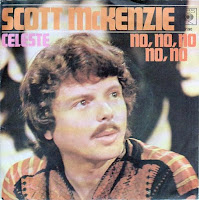They call me 'Mellow yellow' quite rightly... was the first Donovan song I had ever heard. I liked the tune but it wasn't the greatest thing since sliced bread. I don't know exactly when I paid more close attention to Donovan - born Donovan Leitch in Glasgow, Scotland on 10 May 1946.
I think it was after I borrowed the album 'For little ones' from Nelsinho Gomes, a friend of my friend Paulo Naoto Tyba, who lived on Rua Original, in Vila Madalena circa 1968. After listening to the album I was really impressed by how differently - and beautifully - the English language could sound when uttered by Scotsman Donovan in songs such as 'The tinker and the crab' (on the windy beach the sun is shining through with weather fair...), 'The magpie' is a most illustrious bird dwells in a diamond tree... and especially 'Epistle to Derroll' (Come all ye starry starfish living in the deep blue sea / crawl to me I have a proposition to make thee...).
It was around the same time I found out about Simon & Garfunkel sound and Paul Simon's poetry. Not that I knew enough English to know what either Simon or Donovan were singing about but I was interested enough in the sounds of the words to read the lyrics on the back-covers and try to make some sense out of them.
N.B.: Donovan's earlier British hits like 'Catch the wind', 'Colours' and 'Universal soldier' were not released in Brazil.
'Sunshine superman' (457) was Donovan's greatest hit in the USA being #1 at Billboard on 3 September 1966 but it had almost no air-play in Brazil. 'Mellow yellow' went up to #2 at Billboard on 10 December 1966 for 3 wks.
'Mellow yellow' (467) was Donovan's first song that had a fair bit of air play in Sao Paulo. Even though we didn't understand the lyrics my friend Paulo Naoto Tyba who was a Beatlemaniac and knew more English than the average kid thought 'electric banana' meant some kind of drug that one smoked with dried banana peel... some absurd notion he contrived to imagine.
'Hurdy gurdy man' (577) had a most beautiful introduction with Donovan's vibrato voice looming in a most mystical way. It was released in 1968 when Anglo-American music had a great surge in the Brazilian air-waves. It went up to #5 at Billboard on 3 August 1968.
'Atlantis' (599) was without a doubt Donovan's biggest hit in Brazil. As attested by the date written on top of the single label 26 September 1969 - it was released soon after The Beatles's 'Hey Jude' and had a long and repetitive chorus at the end... like Simon & Garfunkel's 'The boxer' (CBS-33-605) too. Jee, we had to stretch our patience to the limit to go through 2 or 3 minutes of repetitive chorus. I'm glad this trend sort of ended as 1969 turned into 1970.
Donovan singles released by CBS in Brazil
33-457 - Sunshine superman / The trip - 1966
33-467 - Mellow yellow / Sunny South Kensington - 1967
33-548 - There is a mountain / Isle of Islay - 1968
33-577 - Hurdy gurdy man / Jennifer Juniper - 1968
33-599 - Atlantis / To Susan in the West Coast waiting - 1969
66.100 - Trudi / Barabajagal - 1969 (Epic)
66.109 - Celia of the seals / The song of the wandering aengus - 1971 (Epic)
Donovan albums released by CBS in Brazil
37.513 - Mellow yellow - 1967
37.536 - For little ones - 1968
37.611 - Os grandes sucessos de Donovan - 1969
Donovan albums released by Epic-CBS in Brazil
44.047 - Barabajagal - 1969
Open road - 1970
1. Song of the naturalist's wife (Canção da mulher do naturalista)
2. The enchanted gypsy (A encantadora cigana)
3. Voyage into the golden screen (Viagem ao biombo dourado)
4. Isle of Islay (Ilha de Islay)
5. The mandolin man and his secret (O homem do bandolim e seu segredo)
6. Lay of the last tinker (Balada do último funileiro)
1. The tinker and the crab (O funileiro e o caranguejo)
2. Widow with shawl (a portrait) (Viúva com chale... um retrato)
3. The lullaby of spring (Canção de ninar primaveril)
4. The magpie (A pêga)
5. Starfish-on-the-toast
6. Epistle to Derroll (Carta a Derroll)
some Donovan extended-plays released by CBS
56.326 - Lalena / Jennifer Juniper / Hurdy gurdy man / There is a mountain - 1968
22.022 - West Indian lady / Teas / Hi, it's been a long time / The sun is a very magic fellow - 1969
this is probably Donovan's most popular moment in Brazil (circa 1968-1969).




















No comments:
Post a Comment